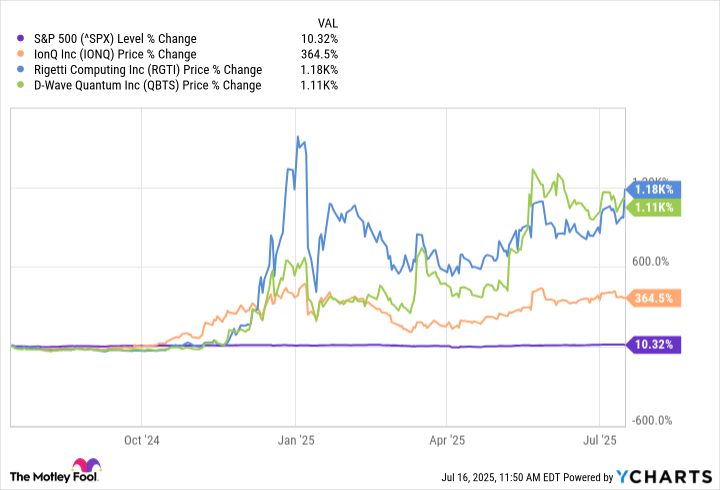The quantum computing revolution has arrived ahead of schedule. What seemed like science fiction just two years ago now powers real computations in research labs and data centers worldwide. The market has taken notice -- quantum computing stocks have delivered strong gains since late 2024.
IonQ, Rigetti Computing (RGTI 0.12%), and D-Wave Quantum have all outperformed the S&P 500 (^GSPC -0.01%) over the past 12 months. The momentum in quantum computing stocks reflects a fundamental shift: Breakthrough innovations have compressed the timeline to commercial quantum advantage from decades to years.
Yet not all quantum stocks deserve your investment dollars. After yesterday's groundbreaking announcement, one company has positioned itself as a compelling contender in the race to commercial quantum computing.

Image source: Getty Images.
When progress is measured in decimal points
Rigetti Computing just achieved what many thought would take years: 99.5% median 2-qubit gate fidelity on its new 36-qubit modular system. This represents a 2x reduction in error rates from Rigetti's previous best -- meaningful progress toward the 99.9% threshold many experts cite as necessary for fault-tolerant quantum computing.
The company demonstrated the industry's largest multichip quantum computer yesterday, built from four 9-qubit chiplets tiled together. This modular architecture matters because it offers a practical path to scaling beyond the fabrication limits that constrain single-chip designs. While Rigetti isn't alone in pursuing modular approaches -- IBM (IBM 1.44%) and others are exploring similar architectures -- the company's execution stands out.
Gate speeds remain a key advantage
Rigetti's superconducting qubits operate orders of magnitude faster than competing technologies like ion traps and neutral atoms. In quantum computing, speed translates to more calculations before quantum states decay -- a critical factor in solving complex problems.
The company plans to launch its 36-qubit system on Aug. 15, with a 100+-qubit, chiplet-based system maintaining that same 99.5% fidelity before 2025 ends. These are ambitious targets in an industry known for delays.
Government contracts signal confidence, not dominance
Rigetti's Q1 2025 results revealed growing government interest in the company's approach. The company secured several research contracts: DARPA's Quantum Benchmarking Initiative worth up to $1 million, Air Force Office of Scientific Research leadership of a $5.48 million consortium, and a 3.5 million pound U.K. Quantum Mission award.
When the Department of Defense and the U.K. government invest millions in your technology, it signals confidence in your approach. These remain R&D contracts rather than full commercial deployments, but they validate Rigetti's technical direction.
Strategic partnerships amplify this validation. Rigetti has partnered with Nvidia on hybrid quantum-classical workflows, suggesting the chip giant sees potential in Rigetti's platform. Quanta Computer closed a $35 million investment in April, bringing manufacturing expertise to the partnership.
The balance sheet provides runway, not immunity
Rigetti completed a $350 million equity offering in June, bringing total cash to approximately $575 million with zero debt. This war chest funds operations without immediate dilution concerns.
Q1 2025 revenue came in at $1.5 million -- minimal for a company at current valuations. While building transformative technology often precedes revenue, investors should monitor cash burn carefully. Operating expenses of $22.1 million quarterly suggest roughly six years of runway at current rates.
The company operates quantum computers over the cloud, sells on-premises systems to national laboratories, and manufactures chips at Fab-1 -- the industry's first dedicated quantum device manufacturing facility. These are real assets, but they're not yet generating meaningful revenue.
The path to quantum advantage remains challenging
Quantum computing represents a generational opportunity comparable to the transistor or the internet. The potential applications -- drug discovery, materials science, cryptography, financial modeling -- could be worth trillions.
Rigetti's modular architecture provides one viable path to scale. By tiling smaller chiplets into larger systems, the company leverages semiconductor industry techniques while working around certain physics constraints. But execution risk remains high, and competitors like IonQ command higher valuations with more commercial traction.
Reality check for quantum investors
Most experts project true quantum advantage -- where quantum computers solve commercially valuable problems faster than classical systems -- arriving between 2026 and 2028. Rigetti's 99.5% fidelity represents real progress, but crossing the final technical hurdles often proves hardest.
For investors willing to accept substantial risk, Rigetti Computing offers exposure to quantum computing's tremendous upside potential. The company has solid technology, adequate funding, and credible partnerships.
But in a field where IonQ, IBM, Alphabet, and several others compete fiercely, picking winners remains a speculative exercise. In other words, position sizing with this name should be paramount right now.





